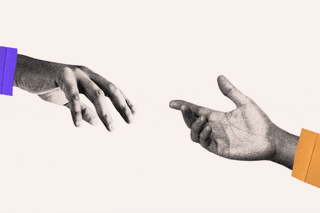
How Some People in Abusive Relationships Found Comfort, Freedom Through Infidelity
Infidelity can sometimes enable people to gain the self-esteem they may have lost as a result of being in an abusive relationship — even empowering them to leave their abusive partners.

Infidelity has a bad reputation. The word conjures up images of one’s partner whispering sweet nothings into the ears of lovers as they lie in bed, alone – agonizing over the loss of love and absence of company in their life, while watching raindrops trickle down window panes. In essence, we perceive the person being cheated upon as a kind of “victim.” But that may not necessarily be the case always.
When the straying partner is the one enduring abuse — physical, emotional, or both – it becomes difficult to deem their infidelity a moral corruption. “I felt trapped in my relationship — it was suffocating and extremely taxing mentally and physically,” Hetal, 22, who was stuck in an emotionally and sexually abusive relationship decided to cheat on her partner, says. She decided to cheat on him with her ex-boyfriend. “Being with my ex again felt comforting and familiar because we had dated for a long time,” she says.
One may, however, be compelled to ask, “Why would they continue to endure abuse, and even cheat, rather than just dumping their partner?” Perhaps, many would, also, argue that the ethics around monogamy still require one to break up with their partner before establishing a sexual — or even romantic — dynamic with another.
But what these reactions don’t take into account is that people in abusive relationships don’t often realize they’re being subjected to abuse – especially when the abuse is emotional. First, people are inherently resistant to the idea that the person they love might not be the right person for them, leading them to rationalize harmful patterns of behavior. Moreover, even if one is able to recognize that they’re being subjected to abuse, leaving isn’t easy — besides financial and cultural constraints, there may also be a severe deficit of self-esteem plaguing the survivor. Individuals who engage in emotional abuse often gaslight their partners, jeopardizing their self-esteem and convincing them they don’t deserve any better.
Hetal recalls being similarly gaslighted too. “[Plus,] he’d compare me to his ex — saying how perfect she was and what a perfect body she had. He’d bully me into not eating outside, and would count calories for me which went so far that I started suffering from an eating disorder… I went down a spiral of depression and anxiety and was constantly shamed for the way I looked,” she admits.
Infidelity can thus become a way for survivors of emotional abuse to receive the validation they are refused in their relationships where they’re constantly negged – breaking the spiral of hate they may feel toward themselves. “The way [my husband] treated me had a role in why I looked elsewhere for acceptance and support,” a Reddit user wrote in 2018.
Related on The Swaddle:
As Marriage Has Changed, So Too, Has Infidelity
Interestingly, even if one doesn’t recognize that they’re in an abusive relationship, there’s still a pervasive feeling of unhappiness they may experience; some survivors refer to having dealt with a “nagging feeling” that something was wrong. This can take a toll on the intimacy they share with their partner – leaving them unsatisfied, sexually and emotionally.
Amana*, 21, who describes the abuse in her relationship as “verbal for the most part and physical, once,” says that being physically involved with people other than her abusive partner made her “feel like I was desirable again — something that my then-boyfriend had completely messed up. [My affairs] validated me in ways that my boyfriend did not.”
Shame and anxiety about one’s body can cause people to dissociate during intercourse – if not avoid physical closeness completely – preventing them from experiencing sexual pleasure and, perhaps, even fulfill their sexual needs. Finding one’s body “unattractive… leads to lower sexual self-esteem, which then often leads to avoidance of sexual activity. Once one area of the sexual cycle is interrupted often several areas of the sexual cycle are disrupted – desire, arousal, and orgasm,” Laurie Watson, a certified sex therapist, had written in Psychology Today, explaining how one’s body image can impact their sex life.
While cheating wasn’t the only recourse available to Amana, it was the only one that worked. “At first, I tried to reason with them. I sought advice from a friend, too, who said I should reply back to my boyfriend in the same tone they used for me, which would force them to reflect on their words. It didn’t help,” she notes.
Bereft of the option to reason, and the self-esteem to walk out, infidelity can become a coping mechanism for people trapped in abusive relationships — offering them fleeting moments of comfort and joy.
In the process, infidelity can, on occasion, also become the way people come to terms with the fact that they’re not being treated well within their relationship. “[E]xploring connection and intimacy outside of their relationship can serve as a means to reclaim a sense of power and agency they may have never felt or were stripped of with an abusive partner… feeling validated by another, experiencing closeness and sexuality without fear, harm, or control can tap into her feeling freedom, and explore an expanded self, reconnecting to those lost pieces of her personal desires, needs, wants and vulnerabilities that are often overlooked and diminished in an abusive relationship,” Marissa Nelson, a relationship therapist, explained.
Related on The Swaddle:
‘Gehraiyaan’ Shows How Childhood Traumas Can Shape People’s Narratives With Sensitivity
As such, infidelity can sometimes enable people to regain the self-esteem they may have lost as a result of being in an abusive relationship – empowering them to leave their abusive partners behind.
“The fact that someone else was actually interested in me made me realize that I was seeing this all wrong… If I hadn’t had that experience I don’t think I would’ve ended it, I would probably be going back and forth still,” a woman, who dealt with both emotional and physical abuse in her relationship for years, admitted on the condition of anonymity. “[C]heating was my escape. It allowed me to put one foot on the other side of the door. All I had to do was pull myself through, and I did.”
Her experience is hardly one of its kind. Yet another woman said, “[C]heating made me realize how much better I deserved to be treated, and it ultimately empowered me to leave my abusive relationship.”
This doesn’t, of course, mean everyone who strays is doing it to escape an abusive relationship, and therefore, their infidelity must be condoned. But it’s also nearly impossible to know what might be transpiring between two people in a relationship – especially since abusers can often seem “charismatic” and “caring” to the outside world. Given how many people find themselves at the intersection of the labels “cheater” and “survivor,” perhaps, it is time for society to unlearn the stigma around infidelity, and lend it a more empathetic lens.
To put it simply: there might be more to any instance of infidelity than what meets the eye — instead of terming someone who has cheated on their partner as a “bad” person outright, trying to understand what drove them to it might be a kinder, even wiser, approach.
“Cheating can definitely go both ways… [but] if you cheat in an abusive relationship, I don’t think it makes you a cheater for life,” notes the woman who chose to remain anonymous. Perhaps, it is our “very skewed opinions on cheating” that prompted her decision to not reveal her identity – allowing her to consciously or unconsciously distance herself from her own narrative, which may have fallen prey to a sense of shame induced by society.
*Name concealed to protect identity.
Devrupa Rakshit is an Associate Editor at The Swaddle. She is a lawyer by education, a poet by accident, a painter by shaukh, and autistic by birth. You can find her on Instagram @devruparakshit.
Related


People Are Willing to Excuse Lies, Misinformation That ‘Might’ Come True: Study
